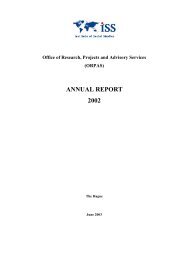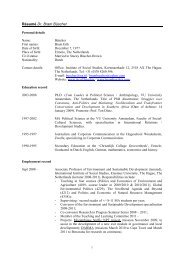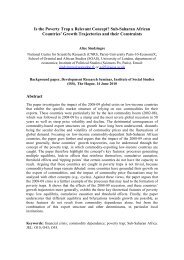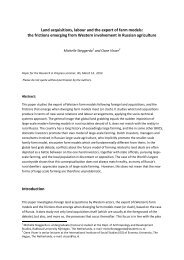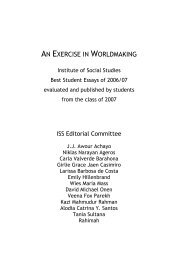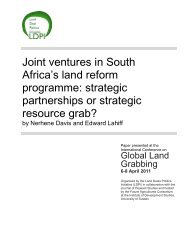AN EXERCISE IN WORLDMAKING 2009 - ISS
AN EXERCISE IN WORLDMAKING 2009 - ISS
AN EXERCISE IN WORLDMAKING 2009 - ISS
Create successful ePaper yourself
Turn your PDF publications into a flip-book with our unique Google optimized e-Paper software.
196 TARA TABASSI<br />
TEXT AS SOCIAL PHENOMENON<br />
WHAT EFFECTS IT ACHIEVES <strong>AN</strong>D HOW<br />
The most vividly disturbing effect of this article is its existence in a<br />
highly politicized and militarized period. Imperative is reflection upon<br />
how it uses deceptive political representation of Afghanistan to strategically<br />
justify violent U.S. invasion. Representation is particularly effective<br />
in descriptions of Pashtunis as inherently violent, with the existence of<br />
the Taliban as the ruling Pashtun elite and U.S. nemesis. Conspicuously<br />
absent is <strong>AN</strong>Y mention of U.S. participation in the conflict. There are<br />
underlying assumptions of justification for using force against the Taliban,<br />
as means of controlling their violent inherency and fanaticism. The<br />
suggestions of Islam’s imminent threat, found both in statements of culture<br />
and faith, and hopeless representations of Gula arguably conclude<br />
with the need for sustained military invasion into Afghanistan, and the<br />
importance of U.S. influence to bring about change and ‘save’ nameless<br />
victimized women, such as Gula.<br />
In light of the 1985 photograph and the 2002 sequel claiming to focus<br />
on Gula, effective objectification occurs. Reflecting on dehumanization,<br />
Said states, ‘Orientalism’s failure [has] been human as much as intellectual;…<br />
in having to take up a position of irreducible opposition to a region<br />
of the world it considered alien to its own, Orientalism failed to<br />
identify with human experience’ (1978:328). Orientalism’s failure is evident,<br />
particularly in Gula’s dehumanization, subtly achieved by maintaining<br />
namelessness and allowing her space only at the article’s end to make<br />
her own statements (dismissed either by male relatives or anti-Islamic<br />
discourse). Dehumanization is also manifested in who is given priority<br />
and ontological value: the photographer and his quest. McCurry’s letter<br />
states that he would ‘like her to look back in ten years and be happy this<br />
happened.’ However amiable that he mentions her well-being, it assumes<br />
the ‘finding’ was not carried out for himself, his career, the magazine, the<br />
EXPLORER’s adventure, the voyeuristic Western audience, or U.S. humanitarian<br />
interventionist discourse, but for her and her happiness.<br />
CONCLUSION<br />
Statements about her leathery skin or glaring eyes disturb me and I wonder<br />
if Gula is aware of those hurtful descriptions. Would she agree that<br />
she never had a happy day except perhaps her wedding day? How did




